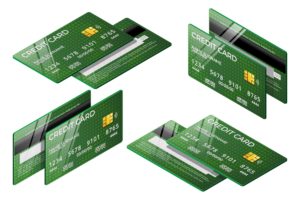Top Differences Between A Credit & Debit Cards
Want to understand the major differences between a credit and a debit card? This blog will help you out. Keep reading to know more.

Source: Freepik
Credit cards and debit cards seem identical at first glance: they are both made of plastic and act as cash replacements. Although there are some parallels between the two payment systems, there are some significant differences customers should know. It is crucial to understand these distinctions between these two key items in the Canadian banking system.
It is beneficial for everybody to have this knowledge, whether you are a newcomer to Canada or a student trying to establish credit.
Interac e-service
(Interac e-service provided by Interac Corporation that allows you to transfer money between your personal and business accounts at participating Canadian banks and other financial institutions.)
Savings Accounts
A savings account’s purpose is to provide a secure place to keep your money for the long term while still earning interest.
Chequing Account
People usually use a chequing account to deposit their paycheck, which then can make regular withdrawals and deposits.
About Debit Cards
Debit cards are a type of payment tool, which lets you make transactions of various kinds by using the money available in your bank account itself.
How Does it Function?
When you need quick access to your money, debit cards are convenient and safe options. It is unusual to see anyone pay cash for a $500 order. Most people are not comfortable keeping so much cash in their pockets, but the transaction would fail if you do not have enough money in your bank account to support the purchase. With Debit cards, you can purchase goods and services at POS or merchant outlets. It allows you to withdraw and deposit cash. You can check your account balance and pay a bill at the ABM.
How to opt for a Debit Card?
It is easy. The first step is to open a bank account. Along with the bank account, you will get a debit card issued by the bank. It can be called a bank card. It is common to be asked to verify your identity when opening a bank account, but a savings account or chequing account does not require a credit check.
Pros of Having a Debit Card
- With a debit card, you can use any Interac ATM anywhere in the world. There could be fees associated with this type of transaction, so before going on holiday, check with your bank to see if there are any international transaction fees.
- When you use a debit card, there are no management or interest fees. Clients who do not have a package, however, will be charged transaction fees.
Cons of Having a Debit Card
- Debit cards are rarely approved for online purchases, even though people are increasingly shopping online.
- If you are a newcomer to Canada trying to establish credit, using a debit card would have no effect on your credit score.


About Credit Cards
Credit cards are another form of payment that can be used to complete purchases. It does, however, provide you with credit that you must repay when your monthly statement arrives. It is better to think of a credit card as a payment option rather than a lending option. While it provides easy access to funds, it typically comes with a higher interest rate than personal loans.
How Does it Function?
Credit cards have a pre-fixed set amount as the credit limit. You can purchase goods and services or transact using a credit card as long as you have the available credit limit. The best way to maintain your credit card is to clear your entire balance every month on the due date. Although you can make the minimum payment and revolve your credit, it is not advisable. In that scenario, monthly interest charges will accrue to your purchase limit.
How to opt for a Credit Card?
It is easy to apply for a credit card online. You may also apply via email or by phone, but it can take weeks to learn if the card issuer has accepted or rejected your application, and you may forget to send in essential forms or supporting documentation.
Pros of Having a Credit Card
- In terms of convenience, credit cards allow you to shop online, you can save your card information on your favorite websites or even do it over the phone for quick checkout.
- They are valid and can be used all around the world.
- With your credit card, you get anti-fraud insurance, which means you will not be held liable for illegal transactions made with your card in the event of a fraudulent transaction.
- Many credit cards come with rewards and incentives or cash back plans. Some credit card companies also have travel insurance or fraud or loss cover for products purchased with the card.
- Credit cards are an excellent way to establish credit.
Cons of Having a Credit Card
The interest rates on credit cards are typically exceedingly high. It is a method of payment that needs discipline. You can pay off your bill as soon as possible or at the very least make the minimum monthly payment.
As you can see, there are several instances where credit cards are preferable to debit cards. You can take advantage of these advantages if you use your credit card to make purchases, as long as you use credit wisely and pay your balance in full every month. It all depends on your requirements and how you want to use it. You could be a student, a new mom, or a business owner, wanting to opt for a credit or debit card. Advisors will assist you in sorting through all the various cards and determining which one is right for you. To learn about which are the factors that affect your credit score see the article below.



